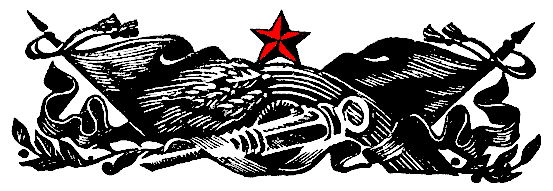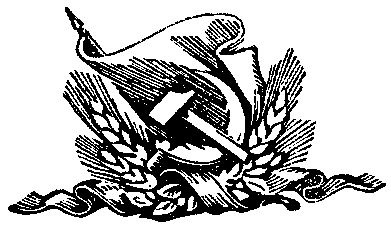
1936 CONSTITUTION OF THE USSR
Adopted December 1936
THE HIGHEST ORGANS OF STATE AUTHORITY OF THE UNION OF SOVIET SOCIALIST REPUBLICS

THE HIGHEST ORGANS OF STATE AUTHORITY OF THE UNION OF SOVIET SOCIALIST REPUBLICS
ARTICLE 30. The highest organ of state authority of the U.S.S.R. is the Supreme Soviet of the U.S.S.R.
ARTICLE 31. The Supreme Soviet of the U.S.S.R. exercises all rights vested in the Union of Soviet Socialist Republics in accordance with Article 14 of the Constitution, in so far as they do not, by virtue of the Constitution, come within the jurisdiction of organs of the U.S.S.R. that are accountable to the Supreme Soviet of the U.S.S.R., that is, the Presidium of the Supreme Soviet of the U.S.S.R., the Council of People's Commissars of the U.S.S.R. and the People's Commissariats of the U.S.S.R.
ARTICLE 32. The legislative power of the U.S.S.R. is exercised exclusively by the Supreme Soviet of the U.S.S.R.
ARTICLE 33. The Supreme Soviet of the U.S.S.R. consists of two Chambers: the Soviet of the Union and the Soviet of Nationalities.
ARTICLE 34. The Soviet of the Union is elected by the citizens of the U.S.S.R. according to electoral areas on the basis of one deputy for every 300,000 of the population.
ARTICLE 35. The Soviet of Nationalities is elected by the citizens of the U.S.S.R. according to Union and Autonomous Republics, Autonomous Regions and national areas on the basis of twenty-five deputies from each Union Republic, eleven deputies from each Autonomous Republic, five deputies from each Autonomous Region and one deputy from each national area.
ARTICLE 36. The Supreme Soviet of the U.S.S.R. is elected for a term of four years.
ARTICLE 37. Both Chambers of the Supreme Soviet of the U.S.S.R., the Soviet of the Union and the Soviet of Nationalities, have equal rights.
ARTICLE 38. The Soviet of the Union and the Soviet of Nationalities have an equal right to initiate legislation.
ARTICLE 39. A law is considered adopted if passed by both Chambers of the Supreme Soviet of the U.S.S.R. by a simple majority vote in each.
ARTICLE 40. Laws passed by the Supreme Soviet of the U.S.S.R. are published in the languages of the Union Republics over the signatures of the President and Secretary of the Presidium of the Supreme Soviet of the U.S.S.R.
ARTICLE 41. Sessions of the Soviet of the Union and the Soviet of Nationalities begin and terminate simultaneously.
ARTICLE 42. The Soviet of the Union elects a Chairman of the Soviet of the Union and two Vice-Chairmen.
ARTICLE 43. The Soviet of Nationalities elects a Chairman of the Soviet of Nationalities and two Vice-Chairmen.
ARTICLE 44. The Chairmen of the Soviet of the Union and the Soviet of Nationalities preside over the sittings of the respective Chambers and direct the procedure of these bodies.
ARTICLE 45. Joint sittings of both Chambers of the Supreme Soviet of the U.S.S.R. are presided over alternately by the Chairman of the Soviet of the Union and the Chairman of the Soviet of Nationalities.
ARTICLE 46. Sessions of the Supreme Soviet of the U.S.S.R. are convened by the Presidium of the Supreme Soviet of the U.S.S.R. twice a year.
ARTICLE 47. In the event of disagreement between the Soviet of the Union and the Soviet of Nationalities, the question is referred for settlement to a conciliation commission formed on a parity basis. If the conciliation commission fails to arrive at an agreeinent, or if its decision fails to satisfy one of the Chambers, the question is considered for a second time by the Chambers. Failing agreement between the two Chambers, the Presidium of the Supreme Soviet of the U.S.S.R. dissolves the Supreme Soviet of the U.S.S.R. and orders new elections.
ARTICLE 48. The Supreme Soviet of the U.S.S.R. at a joint sitting of both Chambers elects the Presidium of the Supreme Soviet of the U.S.S.R. consisting of a President of the Presidium of the Supreme Soviet of the U.S.S.R., sixteen Vice-Presidents, a Secretary of the Presidium and twenty-four members of the Presidium.
ARTICLE 49. The Presidium of the Supreme Soviet of the U.S.S.R.:
ARTICLE 50. The Soviet of the Union and the Soviet of Nationalities elect Credentials Commissions which verify the credentials of the members of the respective Chambers.
ARTICLE 51. The Supreme Soviet of the U.S.S.R., when it deems necessary, appoints commissions of inquiry and investigation on any matter.
ARTICLE 52. A member of the Supreme Soviet of the U.S.S.R. may not be prosecuted or arrested without the consent of the Supreme Soviet of the U.S.S.R., and during the period when the Supreme Soviet of the U.S.S.R. is not in session, without the consent of the Presidium of the Supreme Soviet of the U.S.S.R.
ARTICLE 53. On the expiration of the term of office of the Supreme Soviet of the U.S.S.R., or after the dissolution of the Supreme Soviet prior to the expiration of its term of office, the Presidium of the Supreme Soviet of the U.S.S.R. retains its powers until the formation of a new Presidium of the Supreme Soviet of the U.S.S.R. by the newly-elected Supreme Soviet of the U.S.S.R.
ARTICLE 54. On the expiration of the term of office of the Supreme Soviet of the U.S.S.R., or in the event of its dissolution prior to the expiration of its term of office, the Presidium of the Supreme Soviet of the U.S.S.R. orders new elections to be held within a period not exceeding two months from the date of expiration of the term of office or dissolution of the Supreme Soviet of the U.S.S.R.
ARTICLE 55. The newly-elected Supreme Soviet of the U.S.S.R. is convened by the outgoing Presidium of the Supreme Soviet of the U.S.S.R. not later than one month after the elections.
ARTICLE 56. The Supreme Soviet of the U.S.S.R. at a joint sitting of both Chambers, appoints the Government of the U.S.S.R., namely, the Council of People's Commissars of the U.S.S.R.

ARTICLE 57. The highest organ of state authority of a Union Republic is the Supreme Soviet of the Union Republic.
ARTICLE 58. The Supreme Soviet of a Union Republic is elected by the citizens of the Republic for a term of four years.
ARTICLE 59. The Supreme Soviet of a Union Republic is the sole legislative organ of the Republic.
ARTICLE 60. The Supreme Soviet of a Union Republic:
ARTICLE 61. The Supreme Soviet of a Union Republic elects the Presidium of the Supreme Soviet of the Union Republic, consisting of a Chairman of the Presidium of the Supreme Soviet of the Union Republic, Vice-Chairmen, a Secretary of the Presidium and members of the Presidium of the Supreme Soviet of the Union Republic. The powers of the Presidium of the Supreme Soviet of a Union Republic are defined by the Constitution of the Union Republic.
ARTICLE 62. The Supreme Soviet of a Union Republic elects a Chairman and Vice-Chairmen to conduct its sittings.
ARTICLE 63. The Supreme Soviet of a Union Republic appoints the Government of the Union Republic, namely, the Council of People's Commissars of the Union Republic.

ARTICLE 64. The highest executive and administrative organ of state authority of the Union of Soviet Socialist Republics is the Council of People's Commissars of the U.S.S.R.
ARTICLE 65. The Council of People's Commissars of the U.S.S.R. is responsible to the Supreme Soviet of the U.S.S.R. and accountable to it; and in the intervals between sessions of the Supreme Soviet it is responsible and accountable to the Presidium of the Supreme Soviet of the U.S.S.R.
ARTICLE 66. The Council of People's Commissars of the U.S.S.R. issues decisions and orders on the basis and in pursuance of the laws in operation, and supervises their execution.
ARTICLE 67. Decisions and Orders of the Council of People's Commissars of the U.S.S.R. are binding throughout the territory of the U.S.S.R.
ARTICLE 68. The Council of People's Commissars of the U.S.S.R.:
ARTICLE 69. The Council of People's Commissars of the U.S.S.R. has the right, in respect of those branches of administration and economy which come within the jurisdiction of the U.S.S.R., to suspend decisions and orders of the Councils of People's Commissars of the Union Republics and to annul orders and instructions of People's Commissars of the U.S.S.R.
ARTICLE 70. The Council of People's Commissars of the U.S.S.R. is appointed by the Supreme Soviet of the U.S.S.R. and consists of:
ARTICLE 71. The Government of the U.S.S.R. or a People's Commissar of the U.S.S.R. to whom a question of a member of the Supreme Soviet of the U.S.S.R. is addressed must give a verbal or written reply in the respective Chamber within a period not exceeding three days.
ARTICLE 72. The People's Commissars of the U.S.S.R. direct the branches of state administration which come within the jurisdiction of the U.S.S.R.
ARTICLE 73. The People's Commissars of the U.S.S.R. issue, within the limits of the jurisdiction of the respective People's Commissariats, orders and instructions on the basis and in pursuance of the laws in operation, and also of decisions and orders of the Council of People's Commissars of the U.S.S.R., and supervise their execution.
ARTICLE 74. The People's Commissariats of the U.S.S.R. are either All-Union or Union-Republican Commissariats.
ARTICLE 75. The All-Union People's Commissariats direct the branches of state administration entrusted to them throughout the territory of the U.S.S.R. either directly or through bodies appointed by them.
ARTICLE 76. The Union-Republican People's Commissariats, as a rule, direct the branches of state administration entrusted to them through the corresponding People's Commissariats of the Union Republics; they administer directly only a definite and limited number of enterprises according to a list confirmed by the Presidium of the Supreme Soviet of the U.S.S.R.
ARTICLE 77. The following People's Commissariats are All-Union People's Commissariats: Defense, Foreign Affairs, Foreign Trade, Railways, Post and Telegraph and Telephones, Maritime Transport, River Transport, Coal Industry, Oil Industry, Power Stations, Electrical Industry, Iron and Steel Industry, Non-Ferrous Metallurgy, Chemical Industry, Aviation Industry, Shipbuilding Industry, Munitions, Armaments, Heavy Machine-building, Medium Machine-building, General Machine-building, Navy, Agricultural Procurement, Construction, Paper and Cellulose Industry.
ARTICLE 78. The following People's Commissariats are Union-Republican People's Commissariats: Food Industry, Fish Industry, Meat and Dairy Industry, Light Industry, Textile Industry, Timber Industry, Agriculture State Grain and Livestock Farms, Finance, Trade, Internal Affairs, State Security, Justice, Public Health, Building Materials Industry, State Control.
Bucknell University, Lewisburg, PA 17837
© 1996 Robert Beard